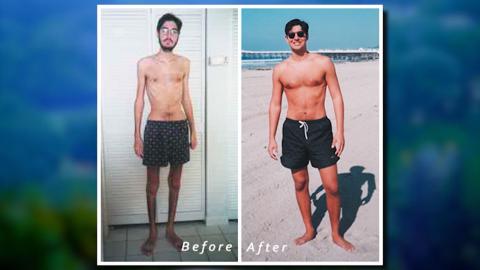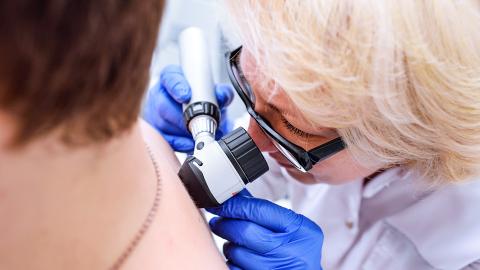Hidden Poison? The Unexpected Places Sugar Lurks
Do foods like skim milk and balsamic vinegar seem healthy? The amount of sugar in these foods may surprise you.
Many so-called health foods are loaded with sugar. These hidden sugars are part of why so many people are unhealthy.
Damaging Sugar Spikes
Americans consume a shocking amount of sugar. Many people eat and drink the equivalent of an entire cup of sugar every day! That's double the amount of sugar average Americans consumed 100 years ago.
All of that sugar can be deadly. Dr. Gerald Edelman, a Dallas oncologist and author of the book, Sugar Rehab, has seen firsthand the damaging effects of too much sugar. He says sugar stimulates cancer cells directly and indirectly.
"In prior years it wasn't quite as clear as it is now, that there is a direct link between sugar spikes during the day and cause of cancer," he said.
Find out what foods have the least sugar impact,
on Lorie's latest Healthy Living blog.
He adds cancer survivors who are also diabetic have a much higher chance of their cancer coming back than people with low blood sugar.
Edelman points out that too much sugar can cause obesity, a known risk factor for many health problems, from heart disease to high blood pressure as well as the common cold.
"These sugar spikes, which really means an elevation in your blood sugar level, what that does is it causes an inflammation state in the body. It's very harmful to your body," he explained.
"So the inflammation state, with all the chemicals that cause inflammation that are secreted as a result of all these high blood sugars, they can cause a lowering of your immune system," he continued.
"So high blood sugar is an immunosuppressant effect. It supresses your immune system, so you're more susceptible to the flu, you're more vulnerable to inflammatory diseases, such as arthritis," he said.
John Speanburg is one of Edelman's patients. He has Hodgkins lymphoma, cancer of the blood. After following Edelman's advice to slash the sugar, he lost weight and has been cancer-free for nine years.
"I love yogurt," he said. "But when you start realizing there's nine grams of sugar in a cup of yogurt, I started cutting out my yogurt."
Sugar Addicts
Edelman suggests an easy way to curtail sugar intake. He recommends looking at a product's nutrition facts panel on the label. He said if an item contains more than two grams of sugars per serving, don't eat or drink it.
He warns not to be fooled by healthy-looking foods. As an example, he pointed to a popular protein shake that contained 44 grams of sugar per serving.
Sugar is highly addictive. Brain imaging shows the pleasure and reward centers light up the same way when a person eats sugar as they do when a person takes cocaine.
Also, it is difficult to get off the roller-coaster ride consisting of the sugar "high" followed by the sugar "crash."
"You're going through spikes and valleys of blood sugar levels," Edelman explained. "When you're at a valley, what's your body want? It wants more sugar. Your body loses its natural equilibrium of intelligently telling you when its hungry and intelligently telling you when its full."
Most people who try to cut back on the amount of sugar they consume stop eating the obvious offenders such as desserts like cakes, cookies, ice cream. Unfortunately, that's only the beginning.
Many foods that appear healthy are just as sweet as dessert. For instance, those little packages of oatmeal can contain as many as 12 grams of sugar per serving. A low-sugar alternative are the old-fashioned, slow-cook oats or steel-cut oats, which contain only one gram of sugar per serving.
'Health Food' Lie?
These types of substitutions are the foundation of nutritionist and best-selling author J.J. Virgin's latest book, J.J. Virgin's Sugar Impact Diet.
She shows how to choose lower-sugar alternatives to foods with high sugar impact. Sugars hidden in foods being marketed as health foods are why so many people have difficulty losing weight.
"What I think is most upsetting is all of these people trying so hard to eat healthy, yet being duped by misinformation," she said. "Because they just go, 'Wow, this isn't working. I'm going to give up.'"
Virgin says low-fat and fat-free foods often contain far more sugar than people realize. For example, many fat-free salad dressings are one-third sugar.
"When we started to pull the fat out of products, we either add, or are left with, sugar," she said. "If you look at a lot of the dairy products, especially cream cheeses, we go to the light cream cheese, and they actually added sugar in."
She said a good diet contains a large percentage of healthful fats, the same ones that have been unfairly demonized.
"More than anything else, fats are satiating. When you eat fat it helps you stay full for hours," she explained. "This is so critical because if you're eating a low-fat diet and you're hungry every couple of hours, you just trained your body to live on sugar, not fat. You should be able to go four to six hours before you need to eat again."
Virgin attributes her svelte figure and glowing hair and skin to a diet high in healthy fat.
"My diet is 40 to 50 percent fat," she said. "Honestly, when I used to eat a low-fat diet, I used to struggle with my weight, my mood, my skin. And this was 20 to 30 years ago when it should have been easy, right?"
"So I eat a lot of avocados, wild fish, grass fed beef, raw nuts and seeds, nut butters, macadamia nut oil, coconut oil and coconut butter," she added.
No Sugar Added
She said a good way to crush sugar cravings is to replace sweets with healthy fats.
"They're delicious and they're satiating and they trigger your reward center, so you don't feel deprived," she said.
Perhaps the biggest sugar scam are the words "fruit" and "juice" on the labels of processed foods. These items are made of the super-sweet concentrated fructose that's left over after the healthy fruit fiber and nutrients have been removed.
Some examples are fruit leathers, fruit snacks, and fruit juice. Dried fruits are also misleading because they often contain more sugar than candy.
Virgin warns about falling for the "no sugar added" claim.
"There's easy ways to say 'no sugar added' and still put it in there," she explained. "Apple juice concentrate is the worst thing you can possibly have. Apple juice concentrate has more fructose than high fructose corn syrup does."
Refined carbohydrates are deceptive because, while not tasting sweet, they turn into sugar after you eat them because the grains have been stripped of the good stuff, leaving only the starch.
Refined carbohydrates are foods like white bread, bagels, buns, and pizza crust, white rice, white pasta, waffles, pancakes, and tortillas.
Even whole grains can be a poor choice because of added sugars. Two slices of whole wheat bread can contain six teaspoons of sugar.
Therefore, don't blindly choose to eat a food simply because it's whole grain. First check the list of ingredients for added sugar. A red flag is any ingredient containing the word "syrup."
Check the Facts
Other seemingly healthful foods that often contain staggering amounts of sugar include muffins, breakfast or energy bars, sports drinks, and energy drinks. Don't rely on the manufacturer's description of the product. Read the nutrition facts and the list of ingriedients.
"We're really trying but the challenge is that the manufacturers know how to prey on our good intentions," Virgin said.
In Sugar Impact Diet, foods are divided into high, medium, and low sugar impact.
For example, white potatoes are high sugar impact, sweet potatoes are medium sugar impact, and pumpkin is low sugar impact.
White rice is high sugar impact, brown rice is medium sugar impact, and wild rice is low sugar impact.
A pasta sauce with sugar added is high sugar impact, with no sugar added is medium impact, and crushed tomatoes, olive oil and basil is low sugar impact.
Just Say No to Sugar
Virgin advises steering clear of artificial sweeteners. Research shows people who consume a lot of them actually tend to gain more weight because they continue to fuel the craving for sweet foods.
"There's also a phenomena called 'calorie disregulation' that they saw with artificial sweeteners," she said. "When you eat something that has a sweet taste with no calories, your body can't calibrate the degree of sweetness with how many calories. So it causes you to overeat."
Edelman said sometimes artificial sweeteners can be helpful when people are trying to break their addiction to sugar. However, he admits they should be used with caution.
"You have to limit some of these sugar-free products because they have sugar alcohols in them and sugar alcohols can act as laxatives," he said.
The best advice is to be aware and "just say no" to sugar... in obvious places like desserts, as well as the hidden ones.




